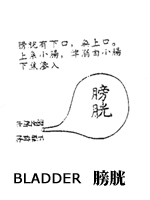Bladder Functions
 In TCM theory, the bladder in located at the lowest position of the body among other organs, which facilitates it to collect waste or useless fluids left over from metabolic processes. The bladder is responsible for storing and excreting urine.
In TCM theory, the bladder in located at the lowest position of the body among other organs, which facilitates it to collect waste or useless fluids left over from metabolic processes. The bladder is responsible for storing and excreting urine. As previously discussed, the lungs, spleen and kidneys are all involving in transforming the ingested water into body fluids, and distributing them for nourishment and moistening purposes. At the end of fluid metabolic process, the useless or waste fluids will be sent down to the kidney and bladder, where they transform the "turbid' water into urine and store in the bladder for excretion. TCM interprets the formation and excretion of urine as process of qi transformation by the kidneys and bladder. When the bladder has accumulated certain amount of urine, and in combination with the promotion of kidney qi, the bladder will open for urination in needed. Disharmony of the bladder that fails to open and close properly can lead to urination problems, such as incontinence or difficult urination.
Since the bladder is opened at the body surface through urethra, toxic damp heat evils from external environment can easily attack it through this exit, common symptoms of this kind of bladder problems include urinary frequency, urgency and pain. In addition, urine is derived from body fluids, the volume of urine excretion and the body’s reserve of fluid are mutually influential to one another. Excessive urination can deplete the body fluids and result in related symptoms. On the contrary, when the body fluids are exhausted, the volume of urine will be decreased too.
The bladder and kidneys are connected and communicated with each other through their meridians, the relationship makes them closely linkup physiologically and pathologically. If kidney qi is sufficient, the bladder is able to open and close normally, then urination will be smooth, which in turn ensure an internal balance of body fluids. When kidney qi is deficient, the qi transformation process is disturbed, the bladder will unable to open and close properly, which can result in urinary difficulty, incontinence, enuresis or frequency. Besides bladder changes that caused urination problems, disorder in qi transformation of the kidneys is also a common reason, especially among those chronic and weak cases. For example, elderly people who present night urination, frequency, inability to pass urine, dripping after urination, and even incontinence are often associated with kidney qi exhaustion, that the kidneys are weakened in its storing and grasping actions. The situations are usually beneficial by kidney tonics.
Click here to read more about the Bladder Meridian


